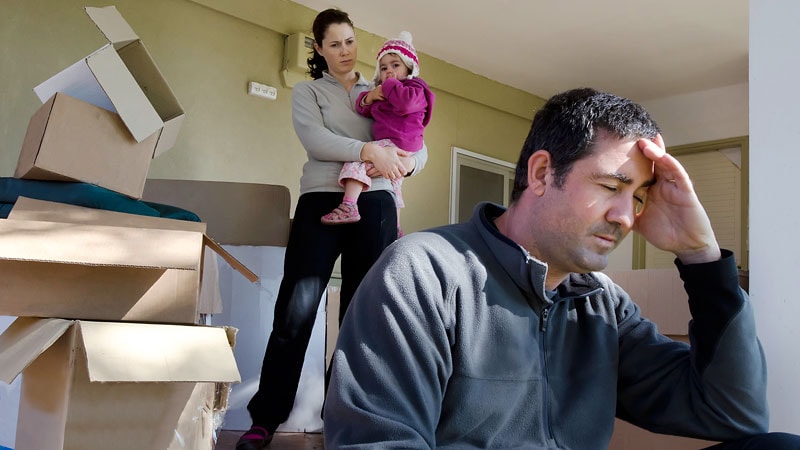Eviction is a housing and financial crisis ― and a health crisis in the making.
Families across the country are feeling the financial squeeze. Rents are rising and inflation has increased the price of, well, everything. Meanwhile, the pandemic-related mortarium on evictions imposed by the Centers for Disease Control and Prevention was struck down in August 2021, and statewide bans on evictions have ended. As a result, the number of evictions in much of the country has hit rates not seen since before the outbreak.
Stable housing is crucial for good health. Research shows that eviction, on the other hand, is associated with a wide range of bad health outcomes, loss of access to medical care, and a vicious cycle of poor health. But physicians and the healthcare system can take steps to mitigate the harm by supporting patients facing eviction and housing insecurity.

Dr Kathryn Leifheit
“Housing is the bedrock that everything else rests on in terms of our health,” said Kathryn Leifheit, PhD, MSPH, a social epidemiologist and assistant professor of pediatrics at the University of California, Los Angeles, David Geffen School of Medicine. “But we also know that rates of housing insecurity in the United States, and in high-income countries in general, are really high.”
Eviction is also a health equity issue.
“The people who are most likely to be evicted or experience housing insecurity are single Black women with children,” Leifheit said. Racial and ethnic health disparities are already a massive problem among this group of people. Rising eviction rates only threaten to widen the gap, she said.
“Upstream and Fundamental”
Housing is one of five social determinants of health, the economic and social conditions that affect the health of individuals and populations. Among these, “housing has this special status in our minds as the most upstream and most fundamental,” Leifheit said.
In recent years, scientists have started to quantify the direct effects of eviction on people’s health.

Dr Karen Sheehan
“It’s so complex, and I don’t think the exact pathway is mapped out yet because it is so hard to do these studies,” Karen Sheehan, MD, MPH, a pediatrician and professor of pediatrics, medical education, and preventive medicine at Northwestern University Feinberg School of Medicine, in Chicago, said. “But we do see lots of associations between eviction and foreclosures and poor health in pretty much every domain.”
One of the main drivers of these poor health effects is stress. “If you don’t have stable housing, it contributes to stress, and that has ramifications in so many different health areas,” Sheehan said.
Research has linked myriad health effects to evictions. One study found that patients who are evicted are more likely to be hospitalized in the 2 years following that eviction, said Gabriel Schwartz, PhD, a social epidemiologist and postdoc with the Social Policies for Health Equity Research Program at the University of California, San Francisco. A study in Sweden found that all-cause mortality in the near term was higher for people who were evicted than for those who kept their homes.
Schwartz has found similarly troubling patterns in his own research. Babies born to pregnant women who experienced housing insecurity during gestation had higher rates of low birth weight and/or per-term birth (risk ratio [RR], 1.73; 95% CI, 1.28 – 2.32), stays in the neonatal intensive care unit or a stepdown unit (RR, 1.64; 95% CI, 1.17 – 2.31), and extended hospitalizations (RR, 1.66; 95% CI, 1.28 – 2.16).
Children who are evicted during childhood appear to have worse cognitive function in elementary school, a critical juncture when they are preparing for later education, Schwartz said. He found that children who had been evicted in middle childhood had scores 0.20 to 0.43 standard deviations below those of similar children who had not been evicted ― the equivalent of as much as a full year of school.
A study published this month in the journal Pediatrics found that children in families that had experienced an eviction ― formal or otherwise ― over the past 5 years were 43% more likely to be in fair or poor health and were 55% more likely to be at risk with regard to their development, according to their parents, than those from households that did not have a history of eviction. Those effects persisted after the researchers adjusted for factors such as income and housing-related hardships.
Eviction can and often does drive people into overcrowded or unsafe housing conditions. Another study found that housing instability could increase the risk of contracting a sexually transmitted disease. And the crowded living conditions many people end up in after an eviction, either at a shelter or with family or friends, can raise the risk for infectious diseases such as COVID-19, monkeypox, and influenza, Schwartz said.
Eviction has even been linked with lead poisoning, possibly because having a record of being evicted can limit families’ housing options, forcing them to compromise on housing or neighborhood quality, Leifheit said.
Falling Through the Safety Net
Moving suddenly to a new area can make it harder to reach doctors or schedule appointments. “You see people falling out of these really vital safety net services at exactly the moment when they need them the most,” Leifheit said.
Medicaid coverage can be imperiled by eviction. Renewing Medicaid enrollment requires families to recertify their eligibility through a form sent through the mail, Leifheit said. In New York City, Schwartz and colleagues found that eviction was associated with 63% higher odds of losing Medicaid coverage compared to demographically similar individuals who were not evicted (95% CI, 1.38 – 1.92; P < .001). They also found that people who were evicted filled fewer prescriptions.
The effects of evictions on health can become cyclical. “Not only can eviction be a cause of poor health, it can also be a consequence,” Schwartz said.
For example, someone who gets evicted might lose their Medicaid coverage, not be able to go to the doctor for a minor health problem, and end up having a major health crisis that lands them in the hospital. This could result in even more financial instability and increase the difficulty in finding stable housing. And so the process repeats, Schwartz said.
How to Help
Housing is a vast and thorny issue, but physicians and other healthcare providers can support patients facing eviction.

Dr Craig Evan Pollack
The first step is to be aware that patients may be in jeopardy of eviction, said Craig Evan Pollack, MD, MHS, an internal medicine physician and professor of health policy and management at the Johns Hopkins Bloomberg School of Public Health, Baltimore. Clinics should screen patients for housing insecurity and eviction. Guides exist on how to screen for social determinants of health with sensitivity, he noted.
Physicians should also be aware of the housing resources and social supports in their community so they can refer patients to groups that help with housing, legal representation, and other services, said Yogesh Shah, MD, MPH, chief medical officer and vice president of medical affairs at Broadlawns Medical Center in Des Moines, Iowa.
For patients facing a housing crisis, Shah also recommends reviewing a patient’s medication list and simplifying it as much as possible. Priority should be given to medications that don’t have to be taken as frequently, such as only once a day, and medications that don’t require special storage, such as being kept cold.
Providers can anticipate the patient’s not being able to come back to the clinic soon. A more comprehensive workup may be performed while the patient is there, telemedicine may be used for follow-up appointments, rather than in-person visits, and patients should be given a hard copy of their chart, Shah said. Patients dealing with an eviction may not be able to access their information digitally or may end up in a different neighborhood or clinic and need an easy way to share their medical history.
Healthcare institutions can also play a role. The team approach, in which patients have access to social workers and providers other than physicians, is central to supporting patients facing or going through housing insecurity, Pollack said.
Hospitals and healthcare institutions should view social services as preventive medicine, Shah said. In recent years, preventive healthcare has been a focus at Broadlawns Medical Center, a county hospital that serves a minority patient population, he said.
“What can hospital systems do? What can we do in the area of education, area of transportation, nutrition, housing, or lack of housing? Our focus is on upstream investment; how can we as a hospital system reach out in the community to help [patients] live better quality of life?” Shah said.
Medical-legal partnerships, in which lawyers provide legal services and expertise to patients and providers, are another way hospitals and clinics can help. “In 9 out of 10 eviction cases, a landlord has a lawyer but a tenant doesn’t,” Leifheit said. Tenants often have legitimate legal claims to remain in their place of residence but can’t mount a defense without access to a lawyer, she said.
Healthcare professionals also should advocate for policies that expand access to safe, affordable housing, Leifheit said. Over the past 2 years, many new housing strategies were tried out and studied. The results of that research could lead to new, data-backed housing policies.
“This is a critically important problem that our patients are facing,” Pollack said. “Working to partner with them, to help, really is our lane.”
Resources for Providers
Local tenant advocacy organizations, which can be found online, have resources to which patients can be referred.
National Low Income Housing Coalition: https://nlihc.org/
Learn about affordable housing needs, state policy, and take action.
The EveryONE Project, American Academy of Family Physicians: https://www.aafp.org/family-physician/patient-care/the-everyone-project.html
Resources for providers who want to learn about and advocate for health equity.
Siren Network, University of California, San Francisco: https://sirenetwork.ucsf.edu/
Learn how to effectively screen for social determinants of health
Systematic review on screening and social prescribing for housing:
https://bmjopen.bmj.com/content/12/4/e054338
Jillian Mock is a freelance science journalist based in New York City. She writes about healthcare, climate change, and the environment. Her work has appeared in many publications, including the New York Times, Audubon Magazine, and Scientific American.
For more news, follow Medscape on Facebook, Twitter, Instagram, and YouTube.
Source: Read Full Article
